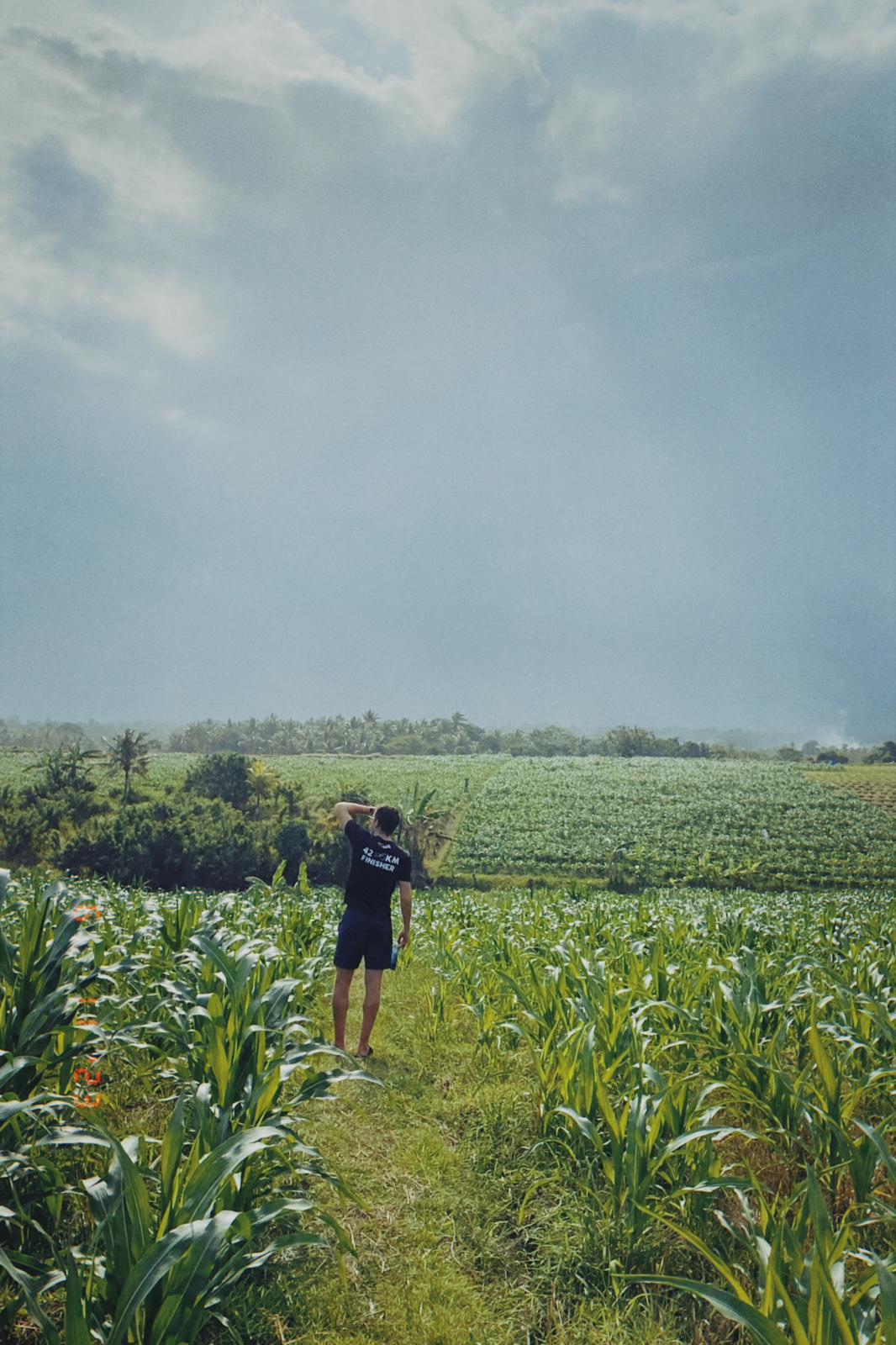I hit a wall, and took a break: Code With Benny

Hi all 🙂. Been a little while.
Since my last Code With Benny update, I ran my first marathon ever (the Singapore Sundown Marathon), returned to Bali, recovered from the worst muscle and joint pain I've ever felt, turned 25, played over 30 hours of tennis, and settled into intentional resting. It's been a month and a half of opposites: the weeks leading up to the marathon were some of the most packed weeks of my life, while those afterwards have been some of the most relaxed.
I've got a lot of thoughts to share. I'll be talking about:
- The idea of "hitting a wall" in endurance sports, and how that extends beyond sport
- My old mental patterns regarding discipline and busy-ness, and running experiments on motivation
- Perceptions of "failure" from not being productive, spending savings
- Excerpts from Day 61 unpublished draft 👀
- What I'll do going forward (restarting the blog after Taiwan travels, and reoptimizing my life for different things)
Hitting the wall
There is a concept in endurance sports called "hitting the wall". Essentially, at a certain point deep into a workout (like long-distance running), your body runs out of glycogen stores (the way the body primarily stores sugars) that prior to that point served as the fuel that kept you going during the workout. At this point, you feel a sudden drop in energy levels, and an onset of fatigue. During the marathon, this hit me around mile 20 (~32km). I literally felt like I couldn't push my legs anymore - it was the starkest, clearest instance of coming up against my body's physical limits that I have ever felt. At this point in the race, I was so deep into the pain and difficulty of the race that my mental strength was no longer an obstacle. My legs just wouldn't respond to me anymore.

I wish I had known more about "hitting the wall" before the race, because if I had, I would've known that, scientifically speaking, the best thing for me to have done at that point would have been to "slow down considerably and increase speed slowly over a period of 10 minutes". Instead, I ended up charging through the wall, and consequently endured one of the hardest hours of my life (the last 6 miles of the marathon).
After the race, I wanted to understand why I had come up against that physical limit, and read deeply about "hitting the wall". As I read, I realized that, in the month leading up to the race, something similar had happened in my mind: I had overloaded myself. For the two months leading up to the marathon, I tried to juggle intense travel, marathon training, coding, content, keeping up with old relationships, creating new ones, and maintaining a routine all at the same time. I traveled to four different countries, traveled all over Bali with a friend from the UK, published 13 blog posts, completed 2 online courses covering 5 different coding languages, pseudocoded my first web app, ran over 150 miles (often in 100F+38C+ degree weather), and ran a marathon.
An illustrative excerpt from my unpublished Day 61 blog thoughts (click here):
On May 13, 2023, I wrote the following thoughts down. I didn't end up publishing them, as this was around when I hit peak burnout and decided to take a break from the 100 days of coding challenge, but I think it provides a good illustration of where my mind was at in the midst of feeling overloaded.
Today was one of the more exhausting days of my life. I'm already running on empty from 7 days of nonstop travel and adventuring through Bali. However, this morning, we decided to wake up at 3am to do a sunrise volcano hike on Mount Batur. It was incredible, and after the hike, some hot springs, and a cafe with unbelievable food and views, we drove 2.5 hours by scooter, descending through the mountains to get to Lovina beach in north Bali. After a struggle to find our Airbnb (no check-in instructions were provided, and the host was uncontactable), we have finally arrived to our villa, where I will refuse to move from for the next three days - I haven't felt this tired in a long time.
Relatedly, coding progress is still slow. One visualization I've thought of that has helped me frame some of the self-inflicted craziness of life right now is the concept of "blocks", where I define a block as anything that is taking up space in your mind. For example, blocks could be logistics planning for a trip, or fixing your broken phone, or remembering to message an Airbnb host that you're coming at a certain time. Blocks could be bigger things, like my 100 days of coding challenge/commitment to code everyday in that time period (hint - mixed results), or marathon training.
Usually, daily life contains a block stack that is only a few blocks high. If you're in routine, your lunch/dinner plans are likely mostly figured out (you may only have to choose from a few options). Most, if not all, necessary physical objects in your life (electronics/kitchen/household tools, and things you might not think of in day-to-day life, like electronics chargers) are within your reach and working well. You're physically adjusted to your context/surroundings and can expect to be able to do whatever you have pre-planned to do within that context; weather, transportation, sleep, etc, are problems that you have already figured out how to address. But when you're traveling and out of routine, you start adding blocks - where am I going to stay? Do I have the right physical items to prepare me for the day? How do I get between places? Where will I do my work? How will I fit it into my schedule while coordinating activities with multiple friends?
Let's say my block stack is usually 4 blocks high in routine life, and my limit is around 9 before I start getting stressed about juggling too many things at once. Because of my tendency to over-commit to things, I tend to push my block stack to 7 or 8. Then, when unexpected things happen (which are more likely to occur when traveling/out of routine), I don't have a buffer before my block 9 "stress zone". So when weeks like last week occur, with my scooter crash, broken phone, other scooter dying and leaving me stranded on the wrong side of Bali, losing a helmet, etc etc, I get pushed into the stress zone with force.
Important caveat: these are good problems to have. I'm very lucky. But it's important for me to reflect on why I'm having problems I'm having, and I think the takeaway of this lengthy write-up is that I need to fill my schedule less. I need a bigger buffer that allows for flexibility, spontaneity, and a more relaxed lifestyle (that, almost counter-intuitively, can lead to more productivity). I'm excited to try this after the marathon (which is in one week!!).
I perpetually overload myself - I have trouble prioritizing. I think I have often used being busy as a way to avoid feelings of inadequacy and imposter syndrome. And I think that the result could be predicted: I burned out.
But whichever label is used to describe feeling overwhelmed in this way, I think "hitting the wall" has taught me that the solution is could be simple: slowing down considerably and increasingly speed slowly.
Experiments
I've had the time of my life these past few months. Of course, there have been ups and downs, but fundamentally, I have really enjoyed the experience of living over this time. Yet one mental pattern I have is that I've never really allowed myself to intentionally rest. Right after reaching a big milestone in my life, I would always dive straight into the next thing: the next big goal, the next routine, the next search for discipline.
And so, I decided to run a little experiment. What if I just did... whatever I wanted to, whenever I wanted to? What would happen to my motivation to create and learn coding? Would it come back on its own? Would I find a new source of sustainable, long-lasting desire to do stuff?
A month of rest later and all I've done is play tennis, do yoga daily, eat, party, date women, spend time with friends new and old, and sleep. Now, I'm starting to feel the beginnings of desire to create and learn again. The experiment has been, preliminarily, successful. And I'm content that I ran the experiment itself 😊
A friend of mine asked: have you felt any feelings of failure because you haven't coded enough? Because you are living off your savings, which are slowly dwindling away, and doing nothing to counteract that? And I told him: yes. I come up against those feelings often. Yet fundamentally, this part of my life is an experiment. Failure, isn't to be avoided: it's to be found, quickly. And with some diligent budgeting, runway calculations, and understanding of the liquidity of my net worth, I know exactly (to the month), how long my savings will last me, which reduces the financial anxiety that might trigger feelings of failure.
On top of this, I am truly convinced that my time right now is much more valuable than my money. I'm extremely lucky: I have a college degree from a decent university. I have an American passport. I speak English natively. And luckiest of all, I have wonderful family and friends who love and support me, and will be there if I fall. Money can come back. Time cannot - I will only be in my mid-twenties, with no responsibilities and some savings, one time in my life (here is an incredible podcast on this concept of living such that you do the things you can only do at certain times/ages/life stages). Is compounding interest really more important than living it up in Bali?
So what's next?
I spent the first 4 months of Bali life prioritizing travel, new experiences, and marathon training over career-building (in my case, coding + content creation).
Now, I want to change what I'm optimizing for: routine, regularity, staying in one place, health/fitness, and sustainable productivity. I've made one last exception to see some of my closest friends from the US in Taiwan this week. But in early July I return to Bali, and then I jump back into routine. I think Code With Benny should also return then 😊.
As always, thank you for all the support and kind words to those I've spoken to about the above. I am, as always, extremely grateful and awed at the endless wisdom, kindness, and love I receive from the people in my life.
Onwards!



Member discussion